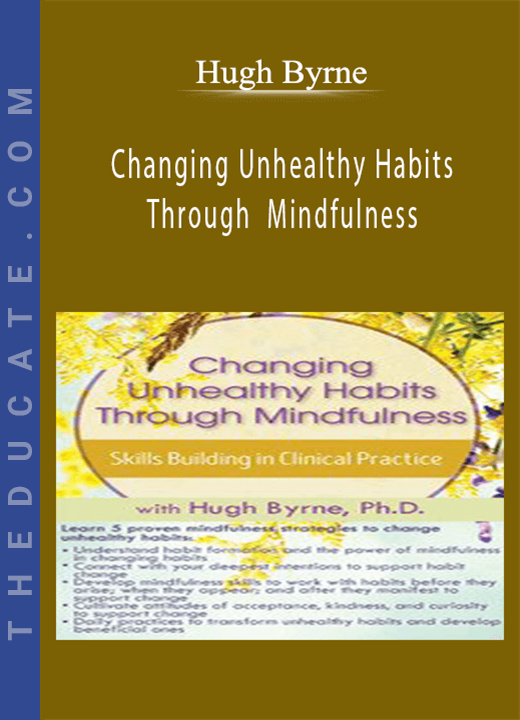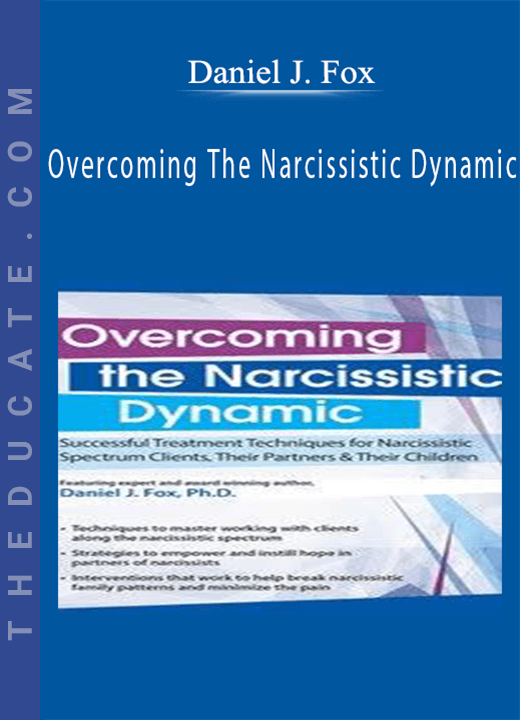Description

Changing Unhealthy Habits Through Mindfulness: Skills Building in Clinical Practice – Hugh Byrne
Learn 5 proven mindfulness strategies to change unhealthy habits:
- Understand habit formation and the power of mindfulness in changing habits
- Connect with your deepest intentions to support habit change
- Develop mindfulness skills to work with habits before they arise; when they appear; and after they manifest to support change
- Cultivate attitudes of acceptance, kindness, and curiosity to support change
- Daily practices to transform unhealthy habits and develop beneficial ones
Our clients often have unhealthy habits that can be hard to change. This seminar will help you understand habits, how they form, and why they can be hard to change, and provide tools to identify and change unhealthy habits.
The seminar will help you recognize and interrupt patterns of suffering that come from habits—whether of excessive thinking and worrying, compulsive or addictive behaviors, or reactive behaviors in relationships—and share this knowledge and practices.
With your support, your clients will learn that even deeply entrenched habits can be changed through mindfulness; attend Dr. Byrne’s powerful seminar & learn skills and practices to begin the process of abandoning unhealthy habits and cultivating more beneficial ones.
- Identify habits that your clients wish to change and other habits that increase well-being and require development.
- Explain why and how mindfulness helps bring behaviors (and patterns of thinking) into the light of awareness to effect meaningful change.
- Define the main brain processes that underpin habit formation and why habits, once established, can be difficult to change.
- Summarize the latest research on habit formation and studies showing the benefits of mindfulness in effecting habit change.
- Describe four main kinds of habits (wanting, resisting, distraction, and doing/busyness) and how mindfulness helps work to support change in each area.
- Demonstrate mindfulness techniques, for building the ‘muscle’ of attention and working non-judgmentally with thoughts that can be shared with your clients.
- Apply mindfulness strategies before, during, and after habits arise to improve the probability of behavior change.
Habits and the Role of Mindfulness in Habit Change
- The brain processes that underpin how habits form and why habits are difficult to change
- The role of mindfulness in bringing what is automatic and unconscious into the light of awareness
- Different kinds of habits—including habits of wanting, aversion, distraction, and doing/ busyness—and how mindfulness can help transform each of these distinct patterns
The Power of Intention
- The importance of connecting with our deepest intentions—what matters most to us
- Identify the habits of thought, word, and action that are obstacles to happiness and well-being
- Make a specific commitment and take concrete steps to bring our behavior into alignment with our deepest aspirations
Harness Attention to Effect Habit Change
- Skills to train participants in moment-by-moment awareness to identify and work with habits
- Before they arise—by avoiding the triggers that activate them
- When they appear—learning to ‘ride the waves’ of challenging experiences
- After they manifest—meet ourselves and our actions with acceptance, kindness, and commitment if we have repeated an unhealthy habit
Cultivate Attitudes that Support Habit Change
- Acceptance of what’s unfolding—the ‘good, the bad, and the ugly’
- Kindness towards ourselves and our experience, as well as to others
- Curiosity or interest in what we are experiencing
Bring it All Home
- Practical tools and materials to integrate mindfulness into client’s daily lives
- Transform unhealthy habits
- Cultivate more beneficial ones when returning to everyday life







9 reviews for Changing Unhealthy Habits Through Mindfulness: Skills Building in Clinical Practice – Hugh Byrne
There are no reviews yet.